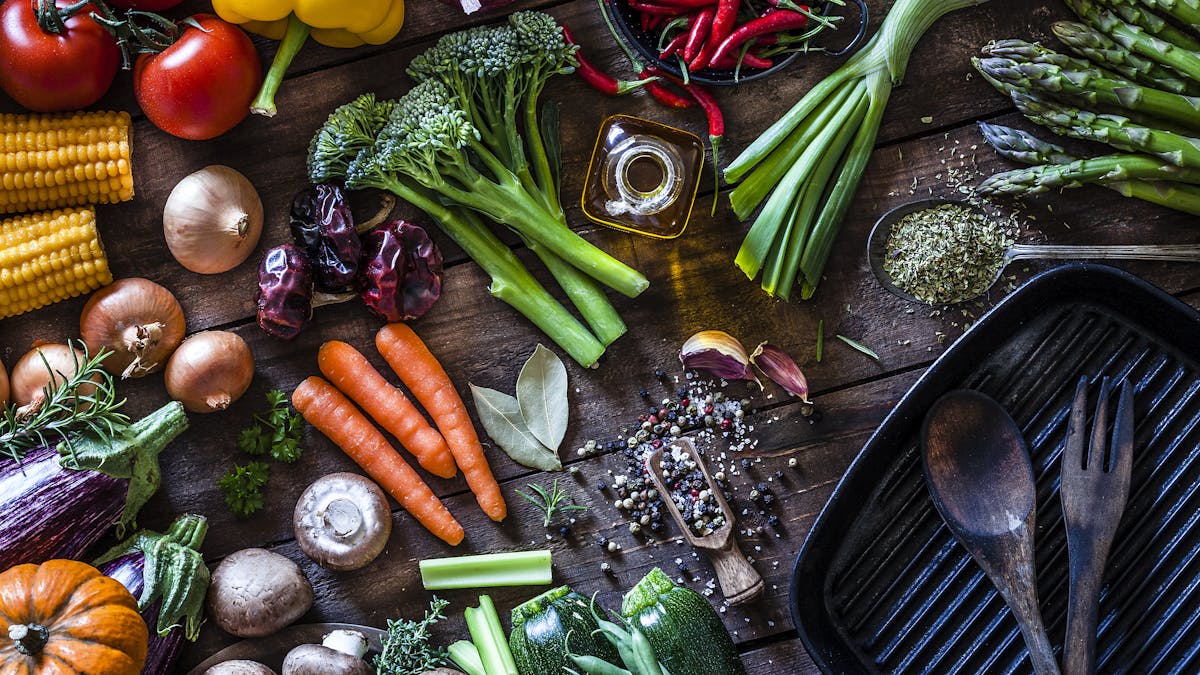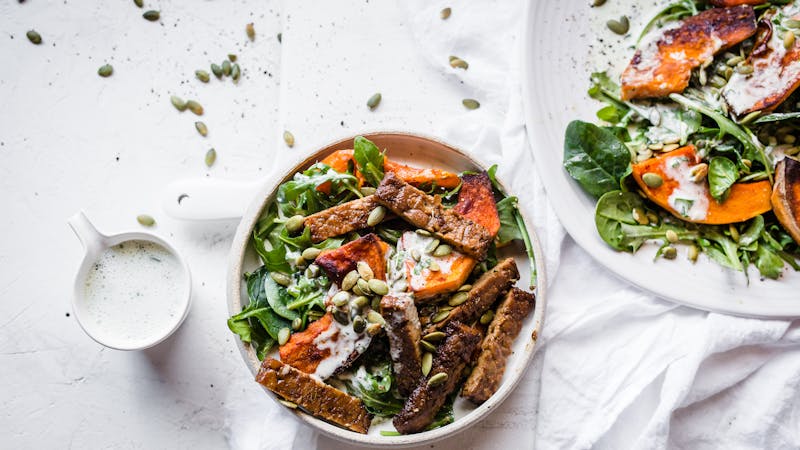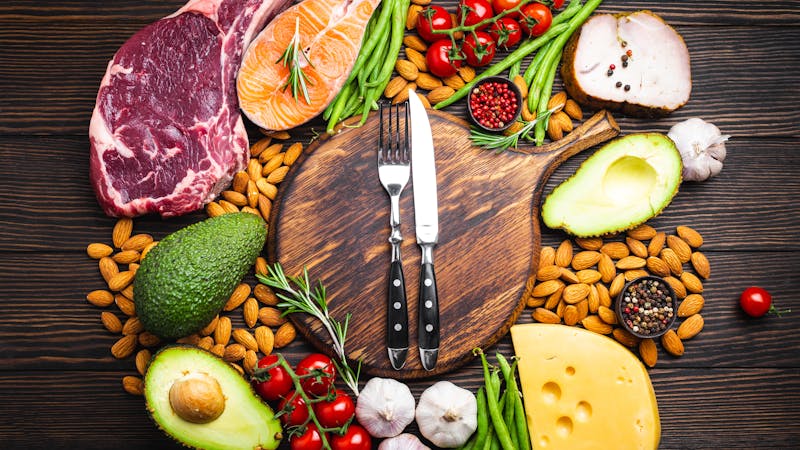Meeting essential nutrient needs on a low-carb vegan diet
Compared to people who eat animal products, vegans are at higher risk of nutrient deficiencies, especially protein, vitamin D, calcium, iron, and zinc.1 Low-carb vegans may also have a more difficult time getting the right amounts of omega-3 fatty acids.
You can meet most of your essential nutrition needs with food, but sometimes supplements can help.
Whether you need to take supplements will depend on your diet, the nutrient levels in your body, and any health conditions you may have. Ask your healthcare provider if you have any concerns about getting the nutrition you need.
Protein
As our low-carb vegan guide says, you likely need more protein on a vegan diet than a diet that includes animal products. If you don’t eat soy or aren’t able to meet your protein needs with other legumes, nuts, and seeds, consider adding a vegan protein supplement at some of your meals.
There are a growing number of vegan protein powders available. Try to choose types that provide at least 20 grams of protein and no more than two grams of net carbs per serving. Also, check for added sugar.
Good options include:
- Pea protein powder
- Hemp protein powder
- Pumpkin seed protein powder
- Sunflower seed protein powder
- Plant protein blends that include seeds, legumes, and grains
Vitamin D
Vitamin D helps keep your bones strong and your immune system healthy, among other things. Unfortunately, many people don’t get enough of this important vitamin.2 Fatty fish is the only food very high in vitamin D, and most plants don’t provide any at all, with the exception of mushrooms, which contain a small amount.
Vitamin D technically isn’t an essential nutrient because your body can make it when your skin is exposed to sunlight. But unless you get a lot of sun on a regular basis or consume fortified foods, you’ll probably need to supplement with vitamin D.
Vitamin D3 has been shown to raise blood levels of vitamin D better than vitamin D2 does.3 However, many vitamin D3 supplements are animal-based. Nordic Naturals, MRM, and other brands offer a vegan vitamin D3 supplement. Also, have your vitamin D levels checked at least every six months so your doctor can adjust your dose if needed.
Calcium
Remember being back in grade school and learning how important calcium is for growing healthy bones and teeth? While this has become more controversial of late, bone health is a special concern for vegans, who tend to have low intakes of both vitamin D and calcium.4
The recommended daily intake (RDI) for calcium is 1,000 mg per day for most people and it is likely best to get it from natural food sources.
If you have low bone mass and don’t get enough calcium in your diet, you may benefit from taking a calcium supplement. However, there are many plant sources (including calcium-fortified nut milks) that can help you meet your calcium needs:
- Tofu (extra firm): 500 mg of calcium and 2 grams of net carbs per 5 ounces (140 grams)
- Almond or other nut milk (calcium fortified): 300-450 mg per 8 ounces (240 grams)
- Sesame seeds: 275 mg of calcium and 3 grams of net carbs per ounce (28 grams)
- Collard greens, cooked: 266 mg of calcium and 4 grams of net carbs per cup (190 grams)
- Almonds: 175 mg of calcium and 6 grams of net carbs per 1/2 cup (64 grams)
- Spinach, cooked: 135 mg of calcium and 1 gram net carb per 3.5 ounces (100 grams)
- Broccoli rabe: 120 mg of calcium and 0.5 grams of net carb per 3.5 ounces (100 grams)
- Kale, cooked: 120 mg of calcium and 3.5 grams of net carbs per 3.5 ounces (100 grams)
Iron
Iron is critical for maintaining healthy red blood cells, carrying oxygen throughout your body, and preventing anemia.
Dietary iron comes in two forms, and the type found in plants isn’t absorbed as well as the type found in meat. Because of this, both vegans and vegetarians are at risk for iron deficiency and iron-deficiency anemia, especially women.5
The RDI for iron is 18 mg for women who haven’t gone through menopause yet and 8 mg for men and postmenopausal women.
Here are a few low-carb vegan foods that can help you meet your iron needs:
- Unsweetened chocolate (100% cocoa): 5 mg iron and 4 grams of net carbs per ounce (28 grams)
- Cooked spinach: 4 mg of iron and 1 gram of net carb per 3.5 ounces (100 grams)
- Pumpkin seeds: 4 mg of iron and 4 grams of net carbs per ounce (28 grams)
- Sesame seeds: 4 mg of iron and 3 grams of net carbs per ounce (28 grams)
- Olives: 3 mg of iron and 3 grams of net carbs per 3.5 ounces (100 grams)
- Hearts of palm: 3 mg of iron and 2 grams of net carbs per 3.5 ounces (100 grams)
To maximize the amount of iron you absorb from plants, include a good low-carb source of vitamin C at meals, like cruciferous vegetables (broccoli, Brussels sprouts, kale) or bell peppers.6
Zinc
Zinc is an often overlooked mineral that plays key roles in immunity, wound healing, and converting the food you eat into energy your body can use.
Most animal sources contain more zinc than plants do. However, including low-carb plant sources in your diet can help you meet the RDI for zinc, which is 8 mg for women and 11 mg for men.
Vegan zinc sources:
- Hemp seeds, hulled: 8 mg of zinc and 4 grams of net carbs per 1/2 cup (80 grams)
- Sesame seeds: 6.5 mg of zinc and 6 grams of net carbs per 1/2 cup (75 grams)
- Unsweetened chocolate (100% cocoa): 2 mg of zinc and 4 grams of net carbs per ounce (28 grams)
- Pumpkin seeds: 2.1 mg of zinc and 4 grams of net carbs per ounce (28 grams)
- Mushrooms, cooked: 1 mg of zinc and 3 grams of net carbs per 3.5 ounces (100 grams)
- Spinach, cooked: 0.8 mg of zinc and 1 gram of net carb per 3.5 ounces (100 grams)
- Flaxseed, ground: 0.6 mg of zinc and 0.2 gram of net carb per 2 Tablespoons (14 grams)
Omega-3 fatty acids
Omega-3 polyunsaturated fatty acids (PUFAs) and omega-6 PUFAs are the two essential fatty acid families. Although omega-6 fats are found in many plant foods, meeting omega-3 PUFA needs can be challenging for vegans.
It’s true that some plants contain short-chain omega-3 fats that your body can convert into long-chain omega-3’s, but this conversion isn’t very efficient in humans. In fact, it’s estimated that we convert less than 10% of the short-chain PUFA alpha-linolenic acid (ALA) into the long-chain PUFAs eicosapentaenoic acid (EPA) and docosahexaenoic acid (DHA).7
The lone vegan source of long-chain omega-3 fatty acids is algae, or seaweed. Supplementing with algae (chlorella, spirulina, or other kinds) has been shown to raise omega-3 fatty acid levels in vegetarians, which are about 60% lower than those of non-vegetarians, on average.8
If you don’t want to eat seaweed or take an algae supplement, aim to get twice the RDI for ALA, which works out to 2.2 mg daily.9
Vegan omega-3 fatty acid sources:
- Algae supplements: EPA and DHA in variable amounts – check the label
- Chia seeds: 2.5 grams of ALA and 1 gram of net carbs per Tablespoon (12 grams)
- Hemp seeds: 3 grams of ALA and 1 gram of net carbs per ounce (28 grams)
- Walnuts: 2.5 grams of ALA and 2 grams of net carbs per ounce (28 grams)
- Flaxseed, ground: 1.6 grams of ALA and 0.1 gram of net carbs per Tablespoon (7 grams)
Additionally, if you don’t eat seaweed or take an algae supplement, use iodized salt to make sure you meet your iodine needs, especially if you have hypothyroidism and consume soy.10
Please note
At Diet Doctor, we try to present the strongest scientific evidence currently available, but we understand that you may want to avoid a vegan diet due to personal history, beliefs, or preferences.
If you don’t want to eat a vegan diet, we support your choice.
Journal of the International Society of Sports Nutrition 2017: Vegan diets: practical advice for athletes and exercisers [overview article; ungraded] ↩
The Proceedings of the Nutrition Society 2017: Vitamin D deficiency as a public health issue: using vitamin D2 or vitamin D3 in future fortification strategies [overview article; ungraded] ↩
American Journal of Clinical Nutrition 2012: Comparison of vitamin D2 and vitamin D3 supplementation in raising serum 25-hydroxyvitamin D status: a systematic review and meta-analysis [strong evidence] ↩
British Medical Journal 2015: Calcium intake and bone mineral density: systematic review and meta-analysis [strong evidence]
European Journal of Clinical Nutrition 2018: Bone turnover, calcium homeostasis, and vitamin D status in Danish vegans [case control study; very weak evidence] ↩
American Journal of Lifestyle Medicine 2016: Iron status of vegetarian adults: a review of literature [review of observational studies; very weak evidence] ↩
Annals of the New York Academy of Science 1980: Interaction of vitamin C and iron [overview article; ungraded] ↩
The American Journal of Clinical Nutrition 2003: Achieving optimal essential fatty acid status in vegetarians: current knowledge and practical implications [overview article; ungraded] ↩
Journal of Human Nutrition & Dietetics 2017: Algal supplementation of vegetarian eating patterns improves plasma and serum docosahexaenoic acid concentrations and omega-3 indices: a systematic literature review [systematic review of randomized trials; strong evidence] ↩
Journal of the Australian Medical Association 2013: Omega-3 polyunsaturated fatty acids and vegetarian diets [overview article; ungraded] ↩
The Journal of Clinical Endocrinology & Metabolism 2011: Iodine status and thyroid function of Boston-area vegetarians and vegans [observational study; very weak evidence] ↩



